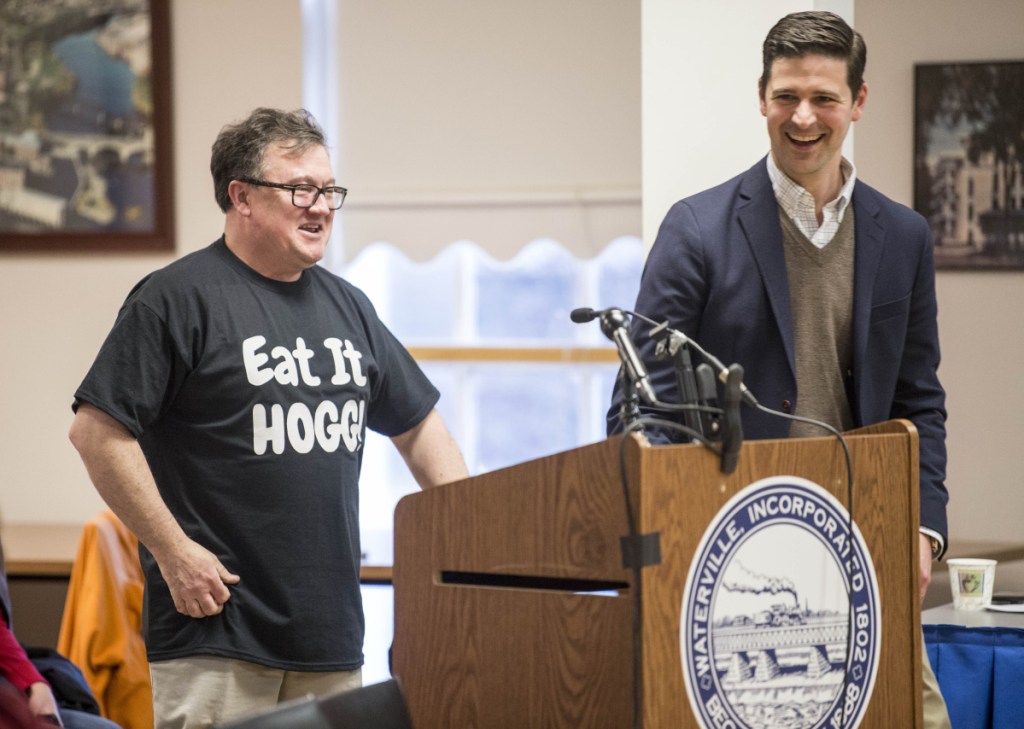It seemed to begin with a bang, with a tweet, captured in a screen shot before it was deleted: “Eat it, Hogg.”
A few years ago, the idea that the mayor of Waterville would hurl an offensive phrase at a survivor of the high school massacre in Parkland, Florida, would have been beyond belief. Why on earth would an elected official from Maine feel the need to involve himself in something that has virtually nothing to do with his position or his constituents?
We live in different times today, and if we are to emerge from it with our ethics and dignity intact, we will need to take a step back and assess the situation with reason, and not with anger and outrage, which only feeds what has become a vicious circle.
Nick Isgro, a Republican, gained broad support when he was first elected mayor in 2014, winning the endorsement of the outgoing mayor, Karen Heck, an independent. Isgro was the first Republican to get the job since Paul LePage served an eventful six years. LePage had played a role, as a city councilor, in a previous recall effort against Democratic Mayor Ruth Joseph, who was removed from office in 1998.
Now it is his protégé, Nick Isgro, who is likely to face recall by the voters. What happened?
It appears that the Nick Isgro who now insults shooting survivors, makes alarming statements about immigrants, and even seems to find Colby College professors worth denouncing, is not the same person voters thought they were electing four years ago.
The person who was respectful to city staff, and helpful in negotiating agreements clearly had developed another, and darker, side. Perhaps it crystallized when Isgro, following a Republican U.S. senator and a Democratic congresswoman’s example, announced in January he was thinking of running for governor himself, because he found the field “incredibly low-energy.”
Instead, three months later, he provided quite a different jolt, one that was soon transmitted by news media around the world.
What happened after the Parkland tweet speaks volumes. When caught out in such behavior, most politicians would say they made a mistake, and apologize. Not Isgro; he remained silent, then denounced others for criticizing him without even acknowledging what he’d done.
Isgro clearly believes there’s a political future for him in modeling the kind of behavior we see almost daily in the Blaine House and the White House — which implies that there are no rules of conduct, that constituents don’t need to be treated with respect, and that there is no truth or falsehood, only loudly expressed opinions.
The expected figures rose to his defense, also never acknowledging Isgro’s actions. LePage wrote to the president of Skowhegan Savings Bank, where Isgo is no longer employed after resigning, to say, nonetheless, “Your decision to discharge Nick Isgro is a mistake you may come to regret.” He also claimed the bank president had “fallen prey to the leftist hate ideology” — even though the only hateful words came from Isgro.
The insistence that every insult, every evasion, every attack is “protected free speech” is one of the saddest and disturbing parts of this whole episode, like so many others. Rather than answer questions from reporters, Isgro chanted “fake news,” as if it would immunize him from ever taking responsibility.
It isn’t easy to remain civil in the face of such provocations. Vigorous disagreement, even personal attacks, aren’t unknown in political systems the world over, with the difference that there are usually corrective impulses, where senior party figures or respected community members calm the waters, rather than — as the governor chose to do — fanning the flames.
Some words and actions really are beyond the bounds of civilized behavior. When Donald Trump said, as his last word on the white supremacist rally in Charlottesville, Virginia, that there were “some very fine people on both sides,” he was wrong.
This is not about “sides,” nor should Isgro’s comments be seen as “taking a side” in a normal political debate. Intimidation, bullying and hatred cannot be defined out of existence.
There is no recall provision for governor, nor any effective impeachment proceeding, either, as advocates of that action some years ago failed to recognize. That’s not true of Waterville’s city charter, where, 20 years after the first mayoral recall vote, another may soon be taking place.
Democracy can seem fragile at times, but if we to are to avoid one of the many forms of tyranny that history so plentifully documents, we must remember how to use it, however difficult or unpleasant the circumstances. There has been much talk of resistance lately; clearly, endurance and fortitude are also required.
Douglas Rooks has been a Maine editor, opinion writer and author for 33 years. His new book, “Rise, Decline and Renewal: The Democratic Party in Maine,” is now available. He lives in West Gardiner, and welcomes comment at: drooks@tds.net
Copy the Story LinkSend questions/comments to the editors.



Success. Please wait for the page to reload. If the page does not reload within 5 seconds, please refresh the page.
Enter your email and password to access comments.
Hi, to comment on stories you must . This profile is in addition to your subscription and website login.
Already have a commenting profile? .
Invalid username/password.
Please check your email to confirm and complete your registration.
Only subscribers are eligible to post comments. Please subscribe or login first for digital access. Here’s why.
Use the form below to reset your password. When you've submitted your account email, we will send an email with a reset code.